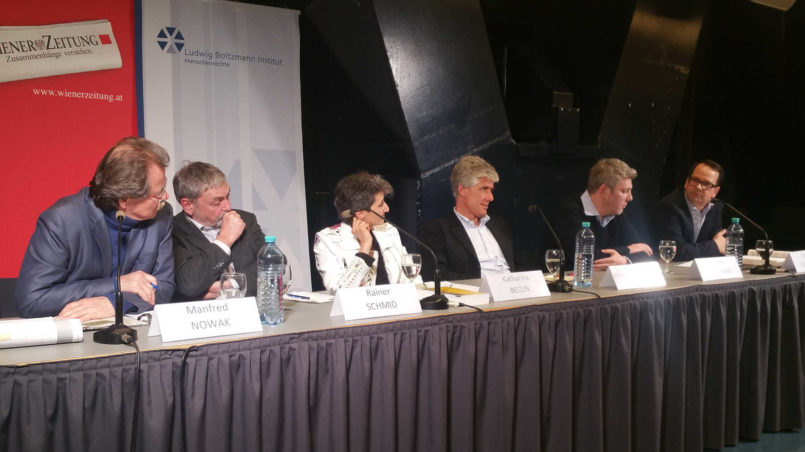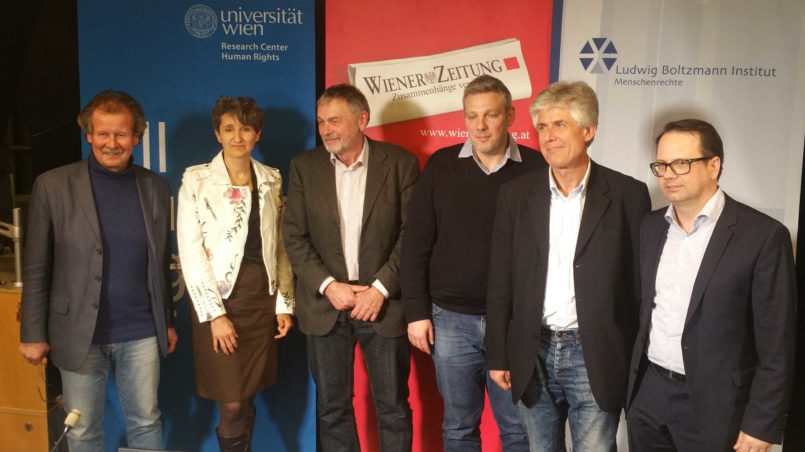Human Rights Talk: Drug Policy and Human Rights in Austria

Event data
- Datum
- 16. 3. 2017
- Host
- Universität Wien in Kooperation mit dem Ludwig Boltzmann Institut für Menschenrechte, der Wiener Zeitung, profil online, Zeitschrift Juridikum and zige.tv
- Location
- Dachgeschoss des Juridicums in Wien
- Event-type
- Podiumsdiskussion
- Participants
- Ass.-Prof.Mag. Dr. Katharina Beclin , Institut für Strafrecht und Kriminologie, Rechtswissenschaftliche Fakultät der Uni Wien
- DSA Roland Reithofer, MBA, Geschäftsführer der Suchthilfe Wien
- Dr. Rainer Schmid , Wissenschaftlicher Leiter von checkit!
- Ass.-Prof. Dr. Stefan Schumann , Johannes Kepler Universität Linz
- Toni Straka, CEFA , Obmann des Hanf Instituts
- Univ. Prof., Dr. iur., LL.M Manfred Nowak , Forschungszentrum Menschenrechte
On 16th March 2017, the Human Rights Talk: “Two steps forward and one step back on the road to human rights based drug policy in Austria” was held on the top floor of the law faculty of the University of Vienna. Prof. Mag. Dr. Katharina Beclin (Institute for Criminal Law and Criminology, Faculty of Law, University of Vienna), DSA Roland Reithofer, MBA (Suchthilfe (Addiction Care), Vienna), Dr. Rainer Schmid (checkit!), Ass.-Prof. Dr. Stefan Schumann (Johannes Kepler University, Linz) as well as Toni Straka, CEFA (Hanf Institute) discussed the topic. The discussion was led by Prof., Dr. iur., LL.M. Manfred Nowak (Human Rights Research Centre)
By way of introduction, Prof. Nowak quoted the author, John Stuart Mill, who stated in his book published in 1859, “On Liberty” (often referred to as the “Bible of Liberalism”), that all forms of prohibition of drugs/alcohol violate an individual’s right to freedom and privacy. As long as our conduct does not encroach on the privacy or rights of others, this is our personal area which should remain free from social or state regulation.
The drug programme of the United Nations has also been significantly influenced by this “war on drugs” which has criminalised both dealers and consumers. Prof. Nowak has personally visited prisoners on death row who were imprisoned due to the consumption of various drugs. Currently Canada, under the present government, is one of the leading voices for a liberalization of drug policy in the sense of “away from punishment and towards treatment”. With this in mind, Prof. Nowak asked the panel where Austria stands on this issue.
Dr. Schmidt in fact referred to Austria as “inconspicuous” as regards its drug policy. It can be considered as neither positive nor negative and he regards Austria to be rather a “free-rider”. The Austrian drug policy consists of making oneself small and hiding behind European drug policy. To the extent that it does not want to expose itself, he personally perceives the Austrian drug policy to be weak. He has the impression that Austria is attempting to lay low, not to expose itself whereby quite reasonable things could emerge.
Drug policy is often a question of knowledge – this is a general problem of drug policy which extends beyond Austria. In his opinion, neither policy and politicians nor the judiciary wants to get involved in the contents of this policy. The requirements of the UN Drug Convention which have to be met are not observed by some countries or are openly opposed. Besides criticism from the UN, there have been no further consequences and it is tacitly accepted.
according to Dr. Schmidt. It is common that the formation of opinions is again returned there, i.e. information is primarily acquired through these channels and as such the rather restrictive national view is reinforced. Where this does not take place, there have been interesting developments: for example, Austria, as one of the first European countries, has introduced a law concerning the problematic nature of the new psychoactive substances. Here an exciting development can be mentioned: on the one hand, there is a Narcotic Substances Act and, on the other hand, there is the new Psychoactive Substances Act (since 2012). Regarding the prosecution of drug trafficking, both are similarly repressive – the difference lies in the consumption. In the Psychoactive Substances Act – in contrast to the Narcotic Substances Act – the consumption as well as the possession of small amounts are excluded from punishment. There has not been a particularly negative response from either the judiciary or the executive to the new Psychoactive Substances Act as far as he is aware.
He has the impression that the Ministry does not wish to take on the lead in this matter. The problem is that the execution occurs on a different level. How strict (brutal or less brutal) the sentences are lies in the hands of the administration or the judiciary in Austria. According to Dr. Schmidt, these could diverge greatly from each other.
Ass.-Prof. Beclin believes that no impulses for change can be expected from the judiciary in this respect. The self-image of the judiciary is strongly reflected in “we enforce laws which are dictated to us”. This is undeniably also the task of the judiciary. It would rather expect appropriate impetuses to change from politicians or science.
Criminal law (which is in parts related to very serious infringements of human rights) is only applied when civil and administrative penalties are insufficient. These infringements involve pecuniary fines and imprisonment as well as detention. As such, the application of criminal law – as a logical consequence – is justified only to safeguard (i.e. protect infringements of) human rights. However, in the context of drug abuse – in the area of self-endangerment or making self-endangerment possible – it is strange that the Narcotic Substance Law is not questioned.
She further stresses that Austria would have the possibility on the international stage to have a strong presence with valid arguments. With the penalising of trafficking and, in particular, of the possession and the consumption, there are indeed violations of human rights, to be precise, self-determination and the freedom to decide on one’s way of living. Unfortunately the current trend is moving in the opposite direction.
Last year a discussion emerged about the tightening of the Narcotic Substances Law, in particular in order to be able to do more about street dealers.
The main argument presented (especially from the Interior Ministry and the executive) was the breach of the peace and the harassment of passers-by. These are classical legal areas in which administrative law should be used to arrive at a solution. It was, however, solved by tightening the Narcotic Substances Law – by doubling the fines for small dealers in most cases. Ass.-Prof. Beclin refers to the manner in which this Law developed as “very questionable”.
Mr. Straka, CEFA, in particular referred to cannabis and stated at first that within “drugs” a differentiation has to be made according to the various classes of substances (narcotics, stimulants, relaxants, etc.). In the Austrian Narcotic Drugs Decree, 80% are not available on the black market as they are drugs of the pharmaceutical industry. The hash joint or the grass cigarette are thereby put into the same category as heroin and, as a result, this has become quite a lifeless topic. Mr. Straka stressed parallels with the homosexual paragraphs in the 1970s: there was a law against this but everyone was doing it anyway.
He personally believes that a social topic is not to be dealt with via criminal law. Lessons could now be learned from good examples in other systems (in America but also in Europe). It is clear to everyone that legalisation will happen. In four years of activism he has not met anyone (from Ministries, etc.) who are of the opinion that the prohibition of cannabis should be retained. Outwith the polemics, these people would have absolutely no arguments which could not immediately be refuted.
According to Straka, the fact that these patients make themselves criminals is, in his opinion, almost tantamount to torture. He believes that the discussion is not progressing due to a lack of information. Many of the so-called experts have no personal experience of drugs beyond coffee, tea, sugar and alcohol. These same people want to pass a qualified judgement on over one hundred substances with diverse effects. You do not become a wine expert, according to Straka, by simply looking at a grapevine. Since the change in law in 2016, one condition has been met: all sides are equally dissatisfied with it.
from left to right: Prof. Dr. iur. LL.M Manfred Nowak, Ass.-Prof. Mag. Dr. Katharina Beclin, Dr. Rainer Schmid, DSA Roland Reithofer, Toni Straka, CEFA, MBA and Ass.-Prof. Dr. Stefan Schumann.
Roland Reithofer stated his wish for a more fundamental discussion. He himself comes from the area of damage control and has much contact with international clients. Regarding the human rights standards in trafficking, Austria is doing quite well from a global perspective. He wanted to give more information about the non-action/non-positioning of politics already referred to by Dr. Schmidt: there is a dilemma for politics. An area in which the population are lacking the expert knowledge but at the same which is very emotional, offers the ideal playing ground for populism, according to Reithofer.
Politicians in a democracy have very little to gain here; instead there is a risk of losing voters and the handling of the topic by the media also presents a great danger. In this context, the media create sensational images of fear. No election in a democracy can be won with the topic of drugs.
He personally did not wish to contribute to the political discussion but policy has to acknowledge the evidence-based information which in the meantime fills half of the shelves in libraries.
The question is how it could be possible that one does not lose in a political sense with this topic (key word: rationalisation). In this context, there are indeed concepts: the “drinking to death” could also be used: after all this is based on the exception/separation of alcohol from drugs by the population.
Ass.-Prof. Dr. Stefan Schumann in comparison introduced the term “the people’s health”. This term from early literature indicates the efforts of the state to prevent the widespread consumption of illegal addictive substances.
At the moment when chronic disease from an addiction is present, the self-determined fate of consumption is not regarded as so autonomous. This possibly entitles the legislature to penalise the consumption (the handling). As regards the incentive effect, he reports on Spain: this country only penalises the consumption of illegal substances when it occurs in public and thereby the incentive effect is displayed. Even then it is only an administrative penalty and now a criminal penalty. This is a significantly different legal model than that in Austria.
In this legal situation it is also possible to penalise trafficking in order to meet the incentivising effect. While trafficking is regulated in a similar manner in many countries (where the focus of the punishment is the trafficking), this is not the case for consumption (as a personal decision).
Ass.-Prof. Schumann considers a further issue to be whether the consumption of addictive substances is accompanied by further drug-related crimes and associated criminality (and thereby with further violations of legally protected rights).
However, if we were to penalise the consumption/handling, we would intervene preemptively in order to reduce the danger of associated criminality. Such a “preemptive intervention” of punishment can hardly be found in other areas of the criminal code.
However, the difference between trafficking and illicit handling would be taken up in the code to the extent that, when there is an addiction, therapy would always take precedence over punishment. Criminalisation would exist but also many possibilities in the law to timely withdraw from criminal proceedings in favour of therapy.
As regards the differentiation made between legal and illegal drugs, he cited the German Constitutional Court as to why cannabis, but not nicotine and alcohol, is criminalised. Ass.-Prof. Schumann left it to the individual to judge this quote:
As regards the comparison between cannabis products and nicotine, according to the Constitutional Court, there is sufficient ground to treat them differently due to the fact that nicotine is not a narcotic drug; there are also just as strong reasons for the different treatment of cannabis products and alcohol. Although it is recognised that the misuse of alcohol can lead to dangers for both the individual and society as a whole, which are equal to or even greater that those of the consumption of cannabis products. Nevertheless, according to the Constitutional Court, note should be taken of the fact that alcohol has a multiplicty of possibilities for use which are not comparable to the intoxicating components or products of the cannabis plant. Substances which contain alcohol serve as foodstuffs and luxury goods; in the form of wine, they are also used in religious cults. In all cases the dominant use of alcohol does not to lead to a state of intoxication, its intoxicating effect is generally known and predominantly avoided by means of social control. In contrast, achieving this intoxicating effect is typically the primary aim of the consumption of cannabis products.
After the statements of the individual experts, there was a possibility to ask questions. Many participants did so. The location was as full as it legally could be: according to Manfred Nowak, late registrations had to be rejected in order not to exceed the legal provisions on the capacity of a room. The evening ended with a glass of wine and further private discussions with the experts.
Translation German-English: Donna Stockenhuber
Credits
| Image | Title | Author | License |
|---|---|---|---|
 |
HRT – Plenum | Patryk Kopaczynski | CC BY-SA 4.0 |
 |
HRT – Drug politics in AT | Patryk Kopaczynski | CC BY-SA 4.0 |

